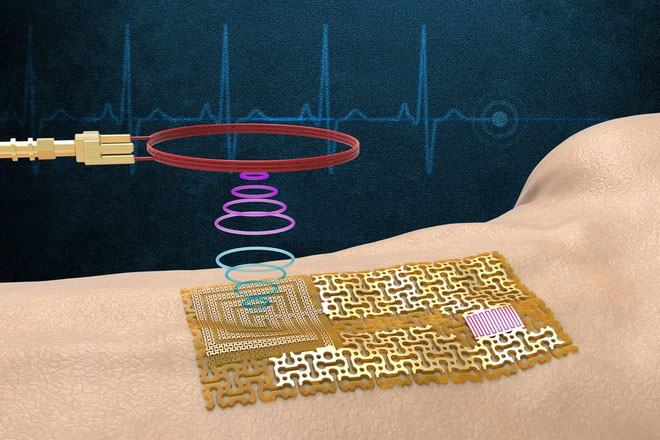Health sensor without chip, stick directly on the skin
Currently, wireless communication wristband sensors have become familiar devices in daily life. Thanks to this sensor, users can know all personal health information such as glucose levels, blood pressure, heart rate and activity intensity during the day.
An engineer from MIT and his colleagues recently published work on a new type of flexible skin sensor. The design, published in the journal Science, promises to be a breakthrough towards wireless sensors without the need for an integrated chip.
Unlike today's popular wearables, its design is extremely minimalist and relies on surface acoustic wave technology to wirelessly transmit health data.

The minimalist wearable sensor requires no batteries or memory chips.
The most significant advantage of this invention lies in the size that fits like a personal bandage, allowing users to monitor their health without the need for additional integration such as memory chips or batteries.
"It's so thin and light, an amazing combination. You'll feel like you're wearing nothing," said inventor Yeongin Kim.
This new sensor is a flexible semiconductor film that conforms to the skin like a band-aid. The internal component consists of an ultra-thin and high-quality sheet of Galium nitride. This is a semiconductor material known for its piezoelectric properties, generating an electrical signal in response to mechanical strain and mechanical vibration as well as in response to electrical impulses.
From this principle, the researchers realized that it is possible to exploit the bidirectional piezoelectric properties of gallium nitride and use the material simultaneously for both sensing and wireless communication.
The idea of Mr. Kim's team comes from solving the user's discomfort when having to wear sensors for a long time. Most current wearable sensors often use integrated circuit chips made up of hard, inflexible parts that need thicker support materials like rubber to stick to the skin. Meanwhile, sweat tends to accumulate under the plastic and rubber layers.

Inventor Yeongin Kim and the product promises to bring revolution to next-generation sensors
'Thousands of transistors in an integrated circuit chip consume a lot of power. If you want more accuracy, you need to consume more power. That is the fundamental limitation of the integrated circuit approach. There is a lot of heat generated from integrated circuit chips. Even if it doesn't do any harm, it can be uncomfortable for the user,' Dr Kim said.
Kim says this new chip-free, wireless approach makes it possible for users to comfortably wear the sensor for long periods of time without any discomfort. 'It's very comfortable and stretches well. My device feels like a part of our skin," the MIT alumnus happily revealed.
- Japan develops ultra-thin thermometers with only 1/4 of the hair
- Chip sensor monitors tumor
- Successfully attached micro sensor to heart tissue
- Ultra-sensitive sensors - prospects for artificial skin
- Use a non-stick pan properly to protect your health
- Sony develops skin health diagnostics technology
- Chip 'pump' drug needles
- The device detects health abnormalities through ... sweat
- Chip is self-recovering when broken
- The US develops chips that allow human and computer brains to communicate directly with each other
- This is an ultra-thin wearable device that is implanted directly into the skin
- Selfie stick was born 88 years ago?
 Daily use inventions come from universities
Daily use inventions come from universities Special weight loss device helps prevent appetite
Special weight loss device helps prevent appetite 8 inventors were killed by their own inventions
8 inventors were killed by their own inventions Iran invented a motor car powered by water
Iran invented a motor car powered by water